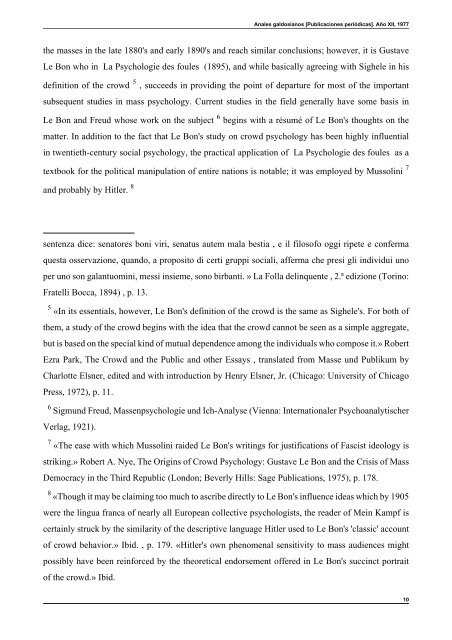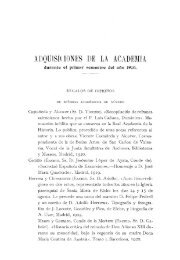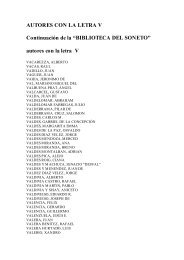You also want an ePaper? Increase the reach of your titles
YUMPU automatically turns print PDFs into web optimized ePapers that Google loves.
Anales galdosianos [Publicaciones periódicas]. Año XII, 1977<br />
the masses in the late 1880's and early 1890's and reach similar conclusions; however, it is Gustave<br />
Le Bon who in La Psychologie des foules (1895), and while basically agreeing with Sighele in his<br />
definition of the crowd 5 , succeeds in providing the point of departure for most of the important<br />
subsequent studies in mass psychology. Current studies in the field generally have some basis in<br />
Le Bon and Freud whose work on the subject 6 begins with a résumé of Le Bon's thoughts on the<br />
matter. In addition to the fact that Le Bon's study on crowd psychology has been highly influential<br />
in twentieth-century social psychology, the practical application of La Psychologie des foules as a<br />
textbook for the political manipulation of entire nations is notable; it was employed by Mussolini 7<br />
and probably by Hitler. 8<br />
sentenza dice: senatores boni viri, senatus autem mala bestia , e il filosofo oggi ripete e conferma<br />
questa osservazione, quando, a proposito di certi gruppi sociali, afferma che presi gli individui uno<br />
per uno son galantuomini, messi insieme, sono birbanti. » La Folla delinquente , 2.ª edizione (Torino:<br />
Fratelli Bocca, 1894) , p. 13.<br />
5 «In its essentials, however, Le Bon's definition of the crowd is the same as Sighele's. For both of<br />
them, a study of the crowd begins with the idea that the crowd cannot be seen as a simple aggregate,<br />
but is based on the special kind of mutual dependence among the individuals who compose it.» Robert<br />
Ezra Park, The Crowd and the Public and other Essays , translated from Masse und Publikum by<br />
Charlotte Elsner, edited and with introduction by Henry Elsner, Jr. (Chicago: University of Chicago<br />
Press, 1972), p. 11.<br />
6 Sigmund Freud, Massenpsychologie und Ich-Analyse (Vienna: Internationaler Psychoanalytischer<br />
Verlag, 1921).<br />
7 «The ease with which Mussolini raided Le Bon's writings for justifications of Fascist ideology is<br />
striking.» Robert A. Nye, The Origins of Crowd Psychology: Gustave Le Bon and the Crisis of Mass<br />
Democracy in the Third Republic (London; Beverly Hills: Sage Publications, 1975), p. 178.<br />
8 «Though it may be claiming too much to ascribe directly to Le Bon's influence ideas which by 1905<br />
were the lingua franca of nearly all European collective psychologists, the reader of Mein Kampf is<br />
certainly struck by the similarity of the descriptive language Hitler used to Le Bon's 'classic' account<br />
of crowd behavior.» Ibid. , p. 179. «Hitler's own phenomenal sensitivity to mass audiences might<br />
possibly have been reinforced by the theoretical endorsement offered in Le Bon's succinct portrait<br />
of the crowd.» Ibid.<br />
10

















